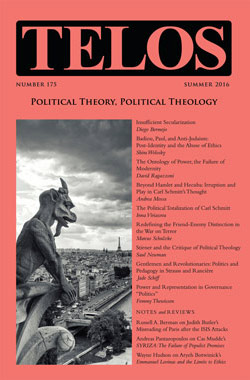As a German national living in Britain for two decades, I have followed the political debate on whether the UK should stay in, or leave, the European Union (EU) with utter dismay. The two official campaigns have prophesied disaster of biblical proportion in the event of Britain either exiting (Brexit) or remaining (Bremain). Economic doomsday and a return to the violent state of nature in case of Brexit, as the “In” camp would have us believe. Alternatively, subjugation to a sinister super-state and marauding masses of migrants in case of Bremain, so say the “Out” camp.
|
Christopher Lasch’s “Liberalism and Civic Virtue,” from Telos 88 (Summer 1991), seeks to gain a better understanding of the internal contradictions of liberalism in one of its most optimistic moments. With the fall of the Berlin Wall, Western economic and political liberalism stood as the last-remaining major ideology of the twentieth century. Amidst the euphoric optimism surrounding the “end of history,” Lasch looks at the challenges that liberalism, with no major competitors on the world stage, poses to itself rather than those posed to it from the outside; for it might just be that liberalism itself is decaying like other major twentieth-century ideologies, though this process is merely delayed. In “On the Political: Schmitt contra Schmitt,” Benjamin Arditi is occupied with the task of revitalizing Carl Schmitt, to open or retrace various interpretative paths that allow us to use Schmitt in trajectories that he did not envisage or did not pursue. Arditi takes his reader by the hand into an exploration of a series of issues arising from Schmitt’s theory: disputes regarding the bellicose nature of the political, the identification of politics in the political, the charge of formalism, and the normative dimension of order. Mina Ahadi is an Iranian exile, living in Germany. She opposed the Shah as well as Khomeini. In 1990 she fled to the West. An adamant secularist, critical of all religion and therefore an opponent of Islamist politics, she does not appear to distinguish between “Islamic” and “Islamist” in her prose. She identifies herself as a communist, she is a leader in the “Central Committee of Former Muslims,” and she is a principled defender of human rights. In two recent open letters, she stakes out positions that not only provide insight into contemporary German political discussions but that are directly relevant to U.S. debates as well. |
||||
|
Telos Press Publishing · PO Box 811 · Candor, NY 13743 · Phone: 212-228-6479 Privacy Policy · Data Protection Copyright © 2024 Telos Press Publishing · All Rights Reserved |
||||



